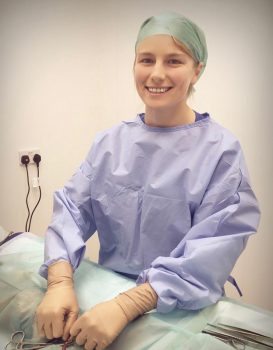It’s very daunting standing in your first consult as a real, qualified vet – even if it is “just a vaccine”, which invariably turns into “actually, this has happened“, or “now you mention it“, and so on.
But why is it we have that constant feeling of being on edge – more so than a few months previously, when we were still students?
A noticeable shift certainly occurs to being an actual vet, rather than someone who always has a supervisor to have the final say, or take the brunt of the backlash of a mistake.
However, is it the accountability or the responsibility worrying us the most?
Pressing concern

As soon as we swear the oath enabling us to register as veterinary surgeons in the UK on graduation day, we become accountable to the RCVS.
In the past year, I have witnessed more than one speech telling us a) not to be scared of the college, and b) not nearly as many complaints, disciplinaries or registration removals occur as we think.
Exact figures aside, the take-home message has been: if you don’t knowingly do anything wrong or illegal, the likelihood of serious consequences is very low. You can’t get struck off for making a simple mistake.
The veterinary press, however, seems to over-represent those who are struck off or reprimanded; after all, you never hear about how many vets were not struck off this month or doing their jobs as they should.
Perhaps this is where the unease stems from? And why the RCVS seems so keen to tell us these individuals convicted of misconduct are a very small minority of the profession?
Are new grads really scared of the RCVS?
Talking to my colleagues, the general feeling is we understand we won’t get struck off for making a mistake. However, if the fear has anything to do with our regulatory body, it’s more the confidence knock we would have as a consequence of having a complaint against us made to it.
Of course, an element of worry surrounds being banned from practising as a vet, but I don’t think I would rank it top of the “things to be afraid of as a new graduate” list.
Instead, in that list, I think responsibility carries a greater weight. As students, we were always supervised and, ultimately, the fate of an animal’s life never truly rested in our hands. Any decisions we made were either backed up or steered in the right direction by clinicians.
Now, it’s down to us. Yes – other, more experienced colleagues should be in each practice with whom to discuss cases or reaffirm decisions, but when it comes to the consult room, you’re on your own.
Experience is king

What if I miss a heart murmur? What if miss signs of glaucoma, a pyometra or a lump? The list goes on. What if I could have done more investigations earlier? What if I misdiagnose something and prolong pain because I didn’t prescribe the right treatment first time?
These questions going on in our heads, coupled with a niggling feeling we have forgotten something or misread a dose, are the root of the fear. I believe this is what scares us, more so than the RCVS.
The animals – and us inherently wanting to do our best for them – makes us worry. We worry our lack of experience could be at the expense of an animal’s health – or even their life.
The only way to get past this is to gain that experience to have confidence in our decisions and learn from the mistakes we will, undoubtedly, make.
My mum said to me this week: “This is the only time you’re ever going to feel like this,” and she’s right. (But don’t tell her I said that). Even if we start a new job in the future, we will have a lot more experience under our belts, so shouldn’t, in theory, feel as lost or scared as we do now.
Being a new graduate vet is a unique position for a myriad of reasons and we need to embrace it. The fear that comes with this newly found responsibility will ease with time, and we can take our careers in whichever direction we choose.

Leave a Reply